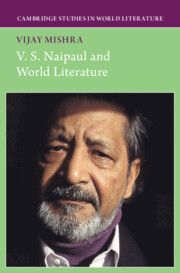Book contents
- V. S. Naipaul and World Literature
- Cambridge Studies in World Literature
- V. S. Naipaul and World Literature
- Copyright page
- Dedication
- Contents
- Figures
- Acknowledgments
- Prologue
- Introduction
- Chapter 1 V. S. Naipaul Aesthetic Ideology and World Literature
- Chapter 2 “The English Language Was Mine; The Tradition Was Not”
- Chapter 3 The Indenture Social Imaginary
- Chapter 4 Empires, Slaves, Rebels, and Revolutions
- Chapter 5 In the Shadow of the Master
- Chapter 6 The Travel Book and Wounded Civilizations
- Epilogue
- Notes
- Works Cited and Select Bibliography
- Index
Introduction
Published online by Cambridge University Press: 01 February 2024
- V. S. Naipaul and World Literature
- Cambridge Studies in World Literature
- V. S. Naipaul and World Literature
- Copyright page
- Dedication
- Contents
- Figures
- Acknowledgments
- Prologue
- Introduction
- Chapter 1 V. S. Naipaul Aesthetic Ideology and World Literature
- Chapter 2 “The English Language Was Mine; The Tradition Was Not”
- Chapter 3 The Indenture Social Imaginary
- Chapter 4 Empires, Slaves, Rebels, and Revolutions
- Chapter 5 In the Shadow of the Master
- Chapter 6 The Travel Book and Wounded Civilizations
- Epilogue
- Notes
- Works Cited and Select Bibliography
- Index
Summary
The Introduction turns to Terry Eagleton’s comment on reading Naipaul (“Great art, dreadful politics”) and asks how critics have addressed this quandary about a great writer. It looks at the critical essays on Naipaul by Homi Bhabha, Edward Said, and Sara Suleri in particular to examine how Naipaul’s works challenge the idea of “postcolonial arrival.” The overall thesis of the book is summed up as a reading in which an author “reads us.” To undertake this project, the work is grounded in a systematic examination of all of the author’s published and unpublished works, the secondary bibliography, and material deposited in the Naipaul Archive, McFarlin Library, University of Tulsa. To make a case for Naipaul’s place in global literary culture, there are four key impulses that govern the book. They are: history, aesthetics, textual engagement, and archival knowledge. To give meaning to that achievement, this book is written with thematic unities in mind. Although chronology is not totally dispensed with, the chapters are structured with the aim of establishing connections within Naipaul’s heterogeneous corpus. But for that interconnectedness to succeed, Naipaul followed an uncompromising commitment to writing as an aesthetic endeavour, uninhibited by fashion or ideology.
Keywords
- Type
- Chapter
- Information
- V. S. Naipaul and World Literature , pp. 6 - 12Publisher: Cambridge University PressPrint publication year: 2024



